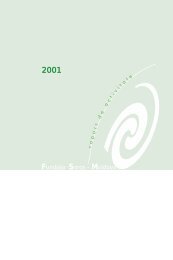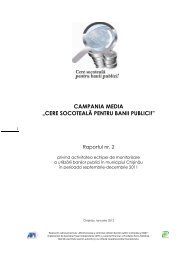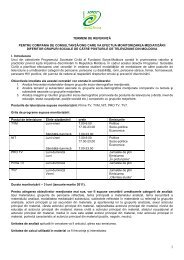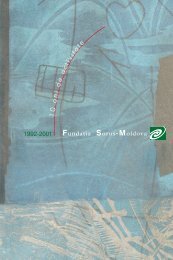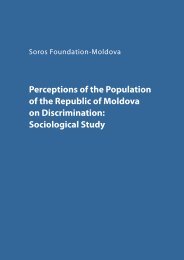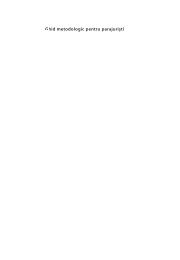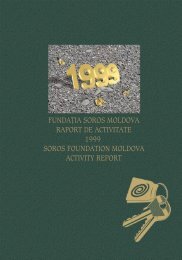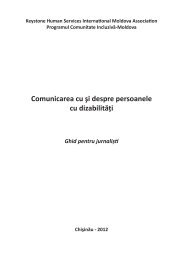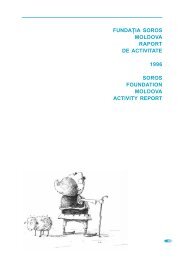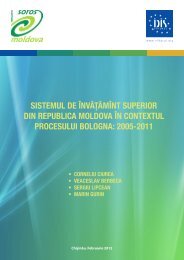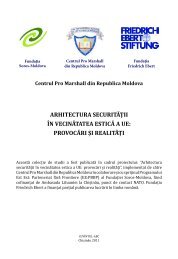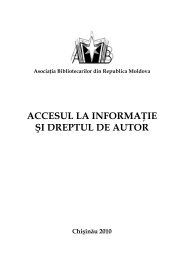Activity report for 1999(PDF) - Soros Foundation Moldova
Activity report for 1999(PDF) - Soros Foundation Moldova
Activity report for 1999(PDF) - Soros Foundation Moldova
You also want an ePaper? Increase the reach of your titles
YUMPU automatically turns print PDFs into web optimized ePapers that Google loves.
Fellowships at Curriculum Resource<br />
Center, CEU, Budapest<br />
Vera MUNTEANU, scientific researcher, National<br />
Institute of Ecology, March <strong>1999</strong> $ 302<br />
Ludmila COJOCARU, Dr. in History, FIUM, October<br />
4-17, <strong>1999</strong> $ 302<br />
Program Administration $ 693<br />
Total Program Expenditures $ 1,295<br />
Research Support Scheme<br />
The Research Support Scheme, a program of the<br />
<strong>Soros</strong> <strong>Foundation</strong> network, is aimed at developing academic<br />
research capacity by supporting original, innovative<br />
and high quality research in social sciences and the<br />
humanities concerning issues particularly specific <strong>for</strong><br />
Eastern and Central Europe, Transcaucasus, Central<br />
Asia and Mongolia.<br />
The following persons received research grants in<br />
<strong>1999</strong>:<br />
Boris BOINCHAN, Sustaninable Agriculture in the<br />
Republic of <strong>Moldova</strong><br />
Luminifla DRUMEA, Perspectives of the <strong>Moldova</strong> –<br />
Transniestria Conflict Resolution: the Role of Civil<br />
Society Building<br />
Nikolai BABILUNGÆ, Perspectives of the <strong>Moldova</strong> –<br />
Transniestria Conflict Resolution: the Role of Civil<br />
Society Building<br />
Andrei FIODOROV, Analysis of Natural Resources<br />
Mangagement in the Black Sea Region<br />
HESP Program Administration $ 7,862<br />
HESP Program Expenditures $ 168,938<br />
Total HESP $ 176,800<br />
INVISIBLE COLLEGE<br />
MOLDOVA<br />
This program was started at the <strong>Soros</strong> <strong>Foundation</strong><br />
<strong>Moldova</strong> in February 1996 in partnership with Open<br />
Society Institute, Budapest, and three universities in<br />
Chiøinæu as a special International HESP pilot-program.<br />
The Invisible College <strong>Moldova</strong> aims to amplify teaching<br />
and research processes in the field of Social Sciences<br />
through extra-curricular programs. The College activity<br />
focuses on the following priority areas: Political<br />
<strong>1999</strong> ACTIVITY REPORT<br />
Science, Sociology, Psychology, Philosophy, Culture<br />
Studies and Anthropology.<br />
The main goal of the College is to contribute to the<br />
education of a new generation of the intellectual elite<br />
in Social Sciences, a group of academics, highly qualified<br />
and open-minded professionals active in governmental<br />
and non-governmental sectors.<br />
The principal target group of the Invisible College<br />
of <strong>Moldova</strong>’s activity is a group of 40 outstanding students<br />
in Social Sciences from different universities of<br />
<strong>Moldova</strong>, selected by way of publicly advertised competitive<br />
exams.<br />
The College curriculum consists of several components,<br />
identified to address the following objectives:<br />
– to provide students with advanced scientific<br />
knowledge as well as practical skills in Social Sciences<br />
and the Humanities by inviting lecturers and experts<br />
from Western, Central Europe and the USA, this being<br />
done in addition to their regular university studies<br />
– to ensure students’ proficiency in English by<br />
means of compulsory intensive courses in order to<br />
facilitate their access to <strong>for</strong>eign academic resources in<br />
Social Sciences (periodical publications, textbooks, conferences,<br />
summer schools) and in<strong>for</strong>mational networks;<br />
to establish academic contacts <strong>for</strong> cooperation with students<br />
and academics from abroad<br />
– to be competitive <strong>for</strong> post-graduate studies in the<br />
best university centers around the world<br />
– to train students in computer science <strong>for</strong> the efficient<br />
use of info technologies in their research work<br />
– to create conditions <strong>for</strong> exchanging and transferring<br />
the advanced knowledge and experiences in Political<br />
Science, Sociology, Psychology and Philosophy<br />
within the academic community in the South-Eastern<br />
Europe by means of common training, international<br />
seminars, summer schools and publications<br />
During <strong>1999</strong> about 80 persons were involved in the<br />
Invisible College (60 students and 20 professors.) The<br />
teaching staff is hired from the best professors of the<br />
higher education and research institutions of <strong>Moldova</strong>.<br />
Additionally, visiting professors from the countries of<br />
Central and Eastern Europe, the European Community<br />
and the USA are involved in the College activities.<br />
Visiting professors are an important aspect of the program<br />
as they bring new ideas, research and teaching<br />
practices.<br />
The academic training and research work of the<br />
students occur in the framework of specialized laboratories<br />
<strong>for</strong> research and professional training housed on<br />
the following addresses:<br />
Sociology: Invisible College <strong>Moldova</strong>, 16/1 Puøkin<br />
St., Chiøinæu MD 2012<br />
Philosophy, Anthropology and Cultural Studies:<br />
Invisible College <strong>Moldova</strong>, 16/1 Puøkin St.,<br />
Chiøinæu MD 2012<br />
Internet Classroom: Invisible College <strong>Moldova</strong>,<br />
16/1 Puskin St., Chiøinæu MD 2012<br />
13



